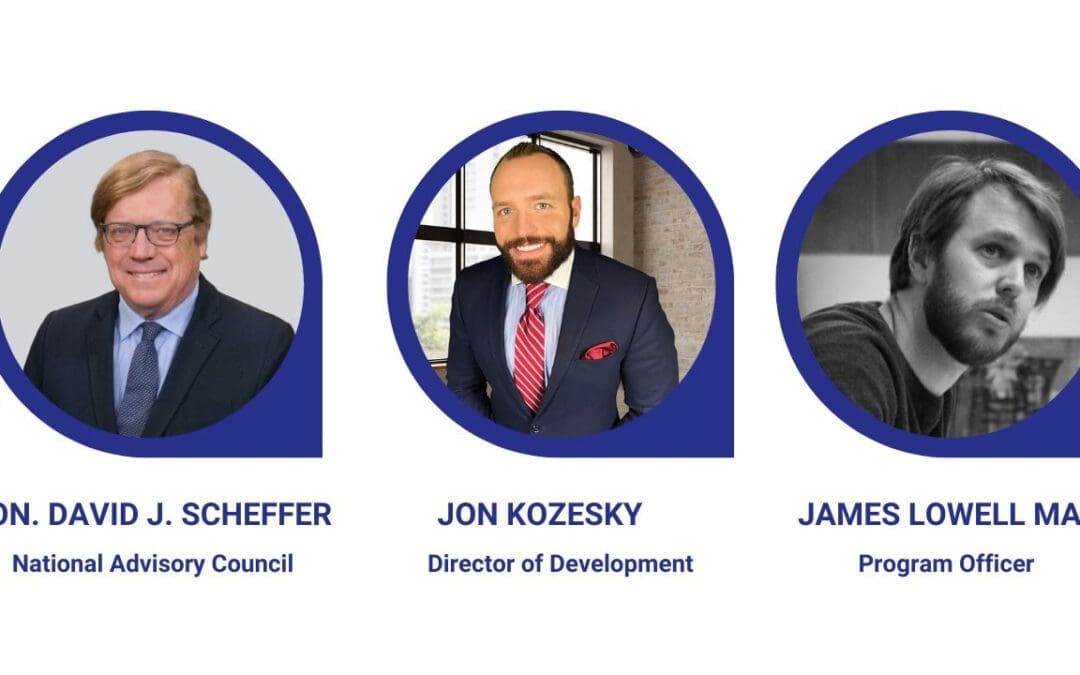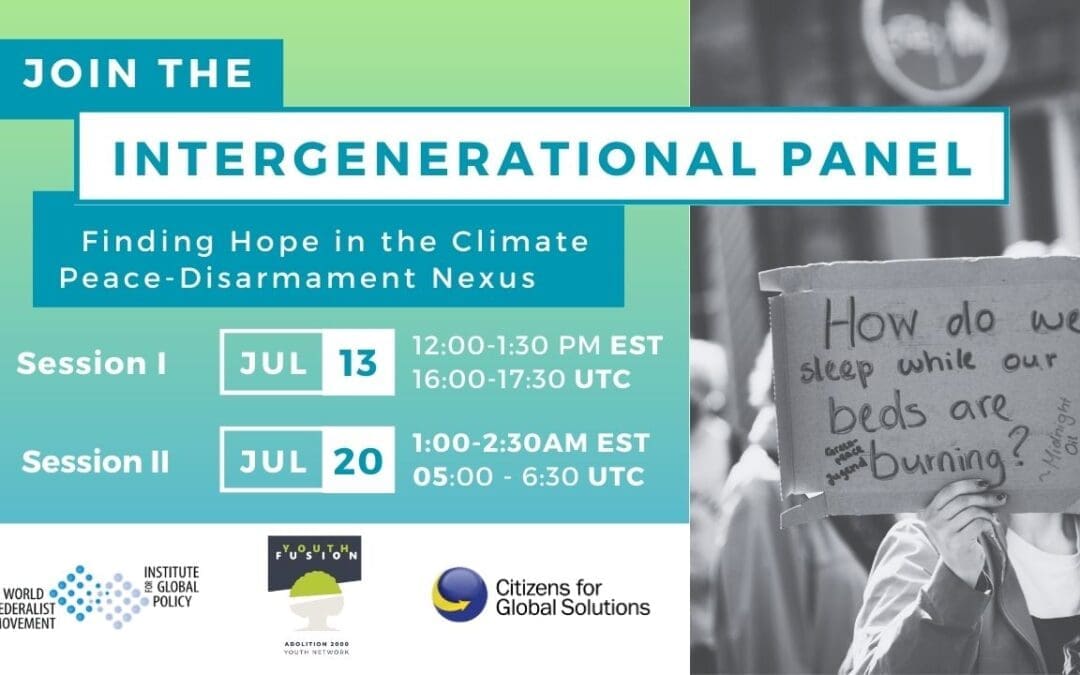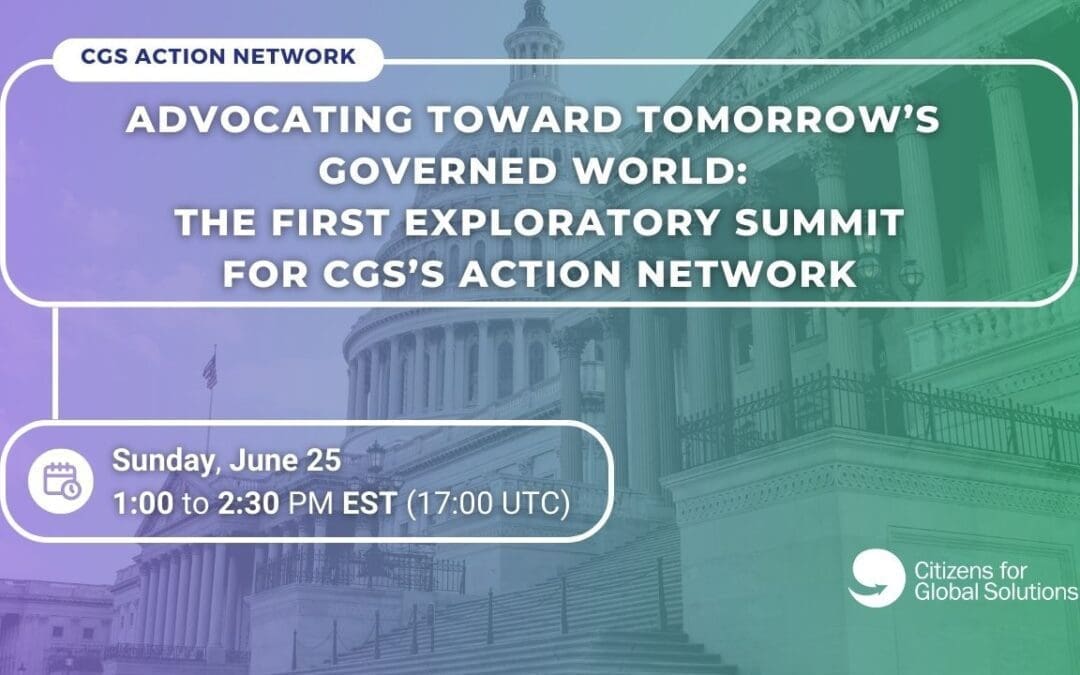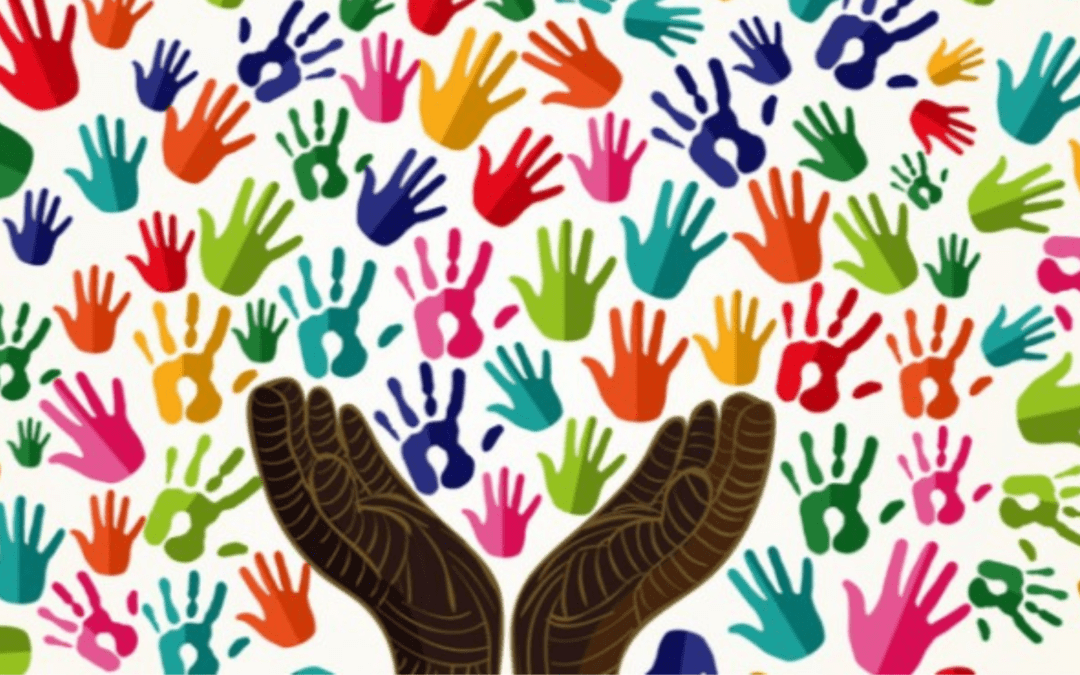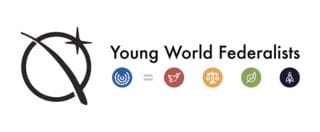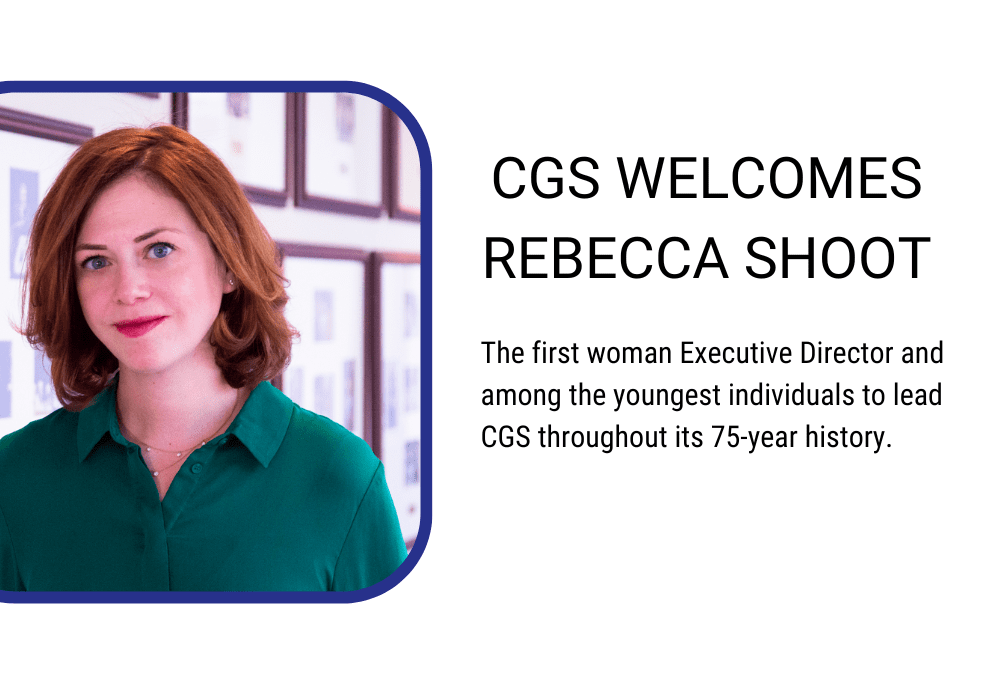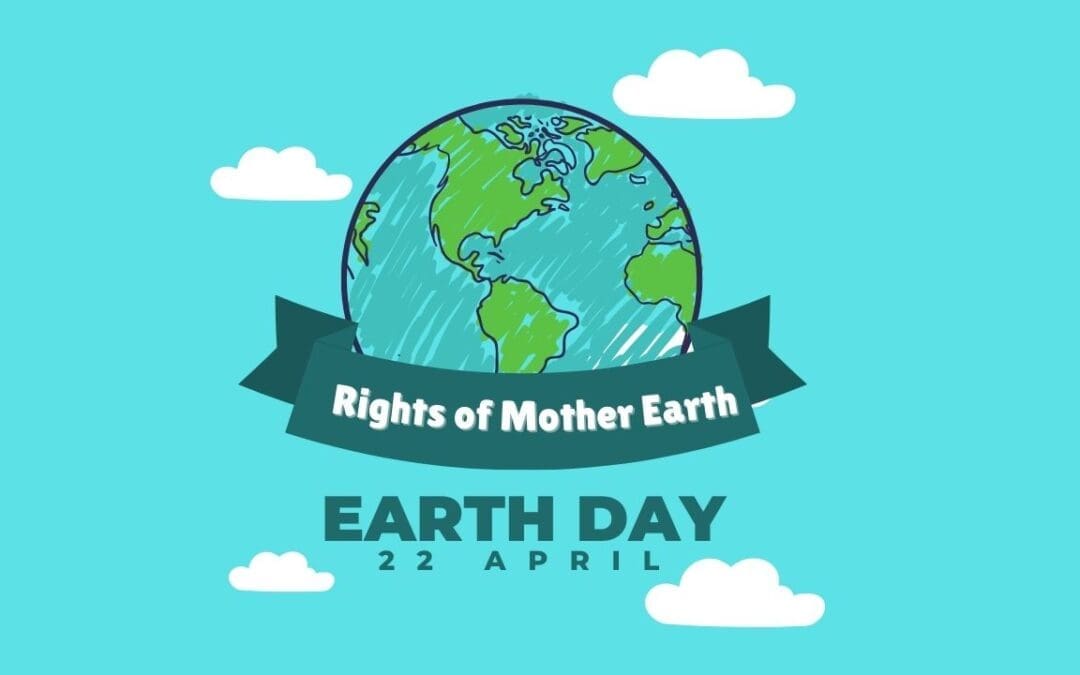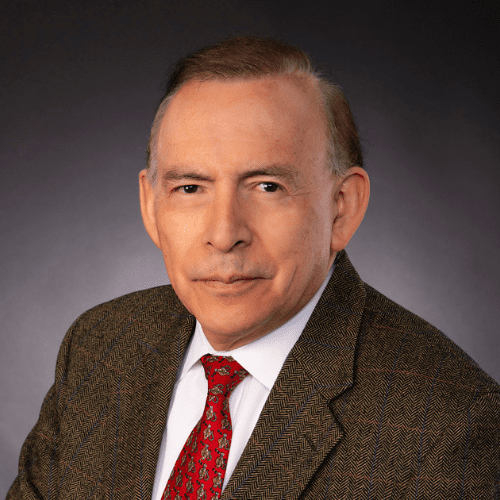
by CGS | Jul 14, 2023 | Press Release
Washington, DC– CGS is honored to announce that Ambassador David J. Scheffer, Professor of Practice at Arizona State University and Senior Fellow at the Council on Foreign Relations, will join our National Advisory Council (NAC).
Of Scheffer’s appointment, CGS Executive Director Rebecca A. Shoot noted, “The NAC has guided the vision and strategic direction of our organization and its predecessors in the World Federalist Movement for more than 75 years. In the fields of law and human rights, the NAC has included such luminaries as Supreme Court Justice William O. Douglas, Nuremberg Prosecutor Benjamin Ferencz, and US Representative and Ambassador Clare Boothe Luce. Amb. Scheffer is a fitting inheritor of this proud tradition given his unparalleled contributions to advancing global justice as a renowned diplomat, esteemed legal professional, and eminent scholar. We are privileged that he will help steer our future course.”
Amb. David J. Scheffer is senior fellow at the Council on Foreign Relations (CFR), with a focus on international law and international criminal justice. Scheffer was the Mayer Brown/Robert A. Helman Professor of Law (2006-2020) and is Director Emeritus of the Center for International Human Rights at Northwestern University Pritzker School of Law. He is Professor of Practice at Arizona State University (Washington offices). He was Vice-President of the American Society of International Law (2020-2022) and held the International Francqui Professorship at KU Leuven in Belgium in 2022. From 2012 to 2018 he was the UN Secretary-General’s Special Expert on UN Assistance to the Khmer Rouge Trials, and he was the Tom A. Bernstein Genocide Prevention Fellow working with the Ferencz International Justice Initiative at the Simon-Skjodt Center for the Prevention of Genocide, U.S. Holocaust Memorial Museum (2019-2021).
During the second term of the Clinton Administration (1997-2001), Scheffer was the first ever U.S. Ambassador at Large for War Crimes Issues and led the U.S. delegation to the UN talks establishing the International Criminal Court (ICC). He signed the Rome Statute of the ICC on behalf of the United States on December 31, 2000. He negotiated the creation of five war crimes tribunals: the International Criminal Tribunals for the former Yugoslavia and Rwanda, the Special Court for Sierra Leone, the Extraordinary Chambers in the Courts of Cambodia, and the ICC. He chaired the Atrocities Prevention Inter-Agency Working Group (1998-2001). During the first term of the Clinton Administration (1993-1997), Scheffer served as senior advisor and counsel to the U.S. Permanent Representative to the United Nations, Dr. Madeleine Albright, and he served on the Deputies Committee of the National Security Council. Ambassador Scheffer received an A.B. (Government and Economics) from Harvard College, B.A (Honour School of Jurisprudence) from Oxford University (where he was a Knox Fellow), and LL.M. (International and Comparative Law) from Georgetown University Law Center.
Additionally, CGS is pleased to welcome two new staff members to our Secretariat team in the roles of Director of Development and Program Officer. We are delighted at the experience, energy, and expertise these impressive individuals bring to help realize CGS’s next chapter.
Jon Kozesky, Director of Development
Jon brings over 17 years of experience in development and fundraising in both the public and private sectors. He started his career in politics working in the Ohio Statehouse and later in the office of U.S. Congressman Steven LaTourette, as well as former Secretary of State Hillary Rodham Clinton. After leaving Capitol Hill, Jon pursued his passion of helping nonprofits secure the resources they needed to best serve their constituents. This passion led to his founding of Jon Thomas Consulting, a boutique nonprofit management and development firm serving organizations across the United States and throughout the world in streamlining their processes and maximizing their revenue growth through grant writing, government affairs, donor stewardship, and major event planning.
Prior to his fundraising career, Jon proudly served his community as a firefighter and water rescue diver. In his personal time, Jon is a champion competitive sailor and a bit of a thrill-seeker, having sky-dived and bungee jumped on 6 continents.
James Lowell May, Program Officer
James May is a programme and project development specialist. He has lived in Serbia since 2005, and prior to joining Citizens for Global Solutions, worked across the Western Balkans on a broad range of issues including human, minority and child rights, accountability for war crimes and crimes against humanity, Holocaust commemoration, democratic participation, social justice and economic empowerment, and environmental restoration.
James began working in the Western Balkans on issues related to accountability for human rights violations, first for the Youth Initiative for Human Rights, a coalition of NGOs active in the countries of the former Yugoslavia, as the network’s development coordinator, then the Lawyers’ Committee for Human Rights, leading a research project documenting the nomenclatural of the Milosevic Regime, and then the Federation of Jewish Communities in Serbia, running a Holocaust research and education project.
James then transitioned from accountability to efforts to protect and fulfill the rights of marginalized communities. For a decade James worked for the Centre for Youth Integration, an NGO that provides specialized services for children and youth in street situations in Belgrade, where he began as a volunteer before taking up a permanent role, while concurrently volunteering for community mental health organizations, as well as consultancy work for a number of local and international organizations, and most recently branched out to apply his experience to the environmental sector, focussing on social impact assessments and community-oriented nature-based solutions projects.
James has a degree in Archaeology from University College London. He was born and grew up in Great Britain. He is an avid cyclist.
About Citizens for Global Solutions
Citizens for Global Solutions is a non-governmental, non-profit, non-partisan membership-based organization that for more than 75 years has brought together a diverse collective of individuals and organizations with a common goal of a unified world predicated upon peace, human rights, and the rule of law. From championing ratification of the UN Charter upon our establishment in 1947 to supporting creation of the International Criminal Court (ICC) 25 years ago to advocating for global instruments to confront today’s enduring challenges of war and climate degradation, CGS recognizes that true progress is a generational enterprise. We invite like-minded individuals and organizations to join us in this mission.
Contact: outreach@globalsolutions.org

by Citizens for Global Solutions | Jun 30, 2023 | Press Release
Washington, DC–Join the Virtual ‘Finding Hope in the Climate-Peace-Disarmament Nexus’ Panel
This Q&A panel discussion, co-hosted by Citizens for Global Solutions (CGS), Parliamentarians for Nuclear Nonproliferation and Disarmament (PNND), Youth Fusion, and World Federalist Movement/Institute for Global Policy (WFM-IGP), will consider how progress on environmental protection is hampered by armed conflict, nuclear threats, and the massive diversion of resources into weapons and war, and will invite collaborate strategizing on potential solutions.
Specifically, we will explore the potential of common security and global governance to foster cooperation to more effectively address climate, peace, and disarmament threats. This intergenerational dialogue will bring together youthful energy and innovation with seasoned expertise and experience, actively engaging our audience to build stronger pathways to a peaceful and sustainable future.
Session I: Americas/Europe/Africa/Middle East
Date: July 13, 2023
Time: 12:00-13:30 EST | 16:00 UTC | 17:00 GMT | 18:00 CET
Register: Zoom Registration for Session I
Session 1 Speakers:
- Kehkashan Basu (UAE/Canada): Founder-President, Green Hope Foundation; United Nations Human Rights Champion; Winner, 2016 International Children’s Peace Prize; Council Member, World Future Council; Former UNEP Global Coordinator for Children & Youth.
- Marie-Claire Graf (Switzerland): Co-Founder Youth Negotiators Academy and Climate Youth Negotiator Programme; UN Youth Climate Champion of Switzerland.
- Prof. Maja Groff (Netherlands): Convenor, Climate Governance Commission; Visiting Professor/Scholar at Faculty of Governance and Global Affairs, Leiden University; Lecturer, Hague Academy of International Law.
- William (Bill) R. Pace (USA): Founder and Inaugural Convenor, Coalition for an International Criminal Court; Former Executive Director, World Federalist Movement-Institute for Global Policy (WFM-IGP); Co-Founder, International Coalition for the Responsibility to Protect.
- Prof Juergen Scheffran (Germany): Professor of Integrative Geography. Chair of the Research Group Climate Change, Center for Earth System Research and Sustainability, University of Hamburg. Principal author, The Climate-Nuclear Nexus.
- Additional speakers to be confirmed
Session II: Asia/Pacific
Date: July 20, 2023 Time: 5:00 AM UTC | 10:30 AM Delhi | 2:00 PM Tokyo | 5:00 PM Wellington 7:00 PM Hawaii | 7:00 AM Eastern Europe | 1:00 AM EST
Register: Zoom Registration for Session II
Session 2 Speakers
- Augusto Lopez-Claros (Chile/Spain): Executive Director, Global Governance Forum. Senior Fellow at the Edmund Walsh School of Foreign Service at Georgetown University. Former Director of the Global Indicators Group in DEC of the World Bank.
- Tadashi Inuzuka (Japan): Co-President, World Federalist Movement – Institute for Global Policy. Executive Director, 3+3 Coalition for a North-East Asia Nuclear-Weapon-Free Zone. Former Senator from Nagasaki.
- Nicole Ponce (Philippines): Co-Founder and Coordinator, I am Climate Justice movement, Asia Front Coordinator, World’s Youth for Climate Justice.
- Disha Ravi (India): Co-founder, Fridays for Future India.
- Dr Justin Sobion LLM (Trinidad and Tobago): Legal Researcher and Teaching Assistant, NewZealand Centre for Environmental Law, University of Auckland. Coordinator, Earth Trusteeship Working Group. Co-editor, “Reflections on Earth Trusteeship: Mother Earth and a new 21st Century governance paradigm.”
- Additional speakers to be confirmed
About Citizens for Global Solutions
Citizens for Global Solutions is a non-governmental, non-profit, non-partisan membership-based organization that for more than 75 years has brought together a diverse collective of individuals and organizations with a common goal of a unified world predicated upon peace, human rights, and the rule of law. From championing ratification of the UN Charter upon our establishment in 1947 to supporting creation of the International Criminal Court (ICC) 25 years ago to advocating for global instruments to confront today’s enduring challenges of war and climate degradation, CGS recognizes that true progress is a generational enterprise. We invite like-minded individuals and organizations to join us in this mission.
World Federalist Movement – Institute for Global Policy
The World Federalist Movement/Institute for Global Policy (WFM/IGP), established in 1947, is a non-profit organization registered in the USA and the Netherlands. Guided by its vision of a just, free, and peaceful world, WFM/IGP works to promote the rule of law and global governance of transnational issues including those related to peace, human rights, and the environment. Our vision is a just, free, and peaceful world, where humanity and nature flourish in harmony, while our mission is to create more effective, transparent, and accountable global governance leading to democratic world federation.
Youth Fusion
Youth Fusion is a world-wide networking platform for young individuals and organizations in the field of nuclear disarmament, risk-reduction and non-proliferation. We focus on youth action and intergenerational dialogue, building on the links between disarmament, peace, climate action, sustainable development and building back better from the pandemic. Our goals are clear: to inform, educate, connect and engage our fellow students, activists and enthusiasts. Through these activities, and as part of the Abolition 2000 Network, we are contributing to the total abolition of nuclear weapons.
Supporting Organizations
3+3 Coalition for a North-East Asia Nuclear-Weapon-Free Zone, Basel Peace Office, Citizens for Global Solutions, Chicago Area Peace Action (CAPA), Climate Governance Commission, Democracia Global, Global Minnesota, Green Hope Foundation, I Am Climate Justice, Parliamentarians for Nuclear Nonproliferation and Disarmament, Peace Action, The Peace Alliance, Stimson, Upper Hudson Peace Action, World Federalist Movement Institute for Global Policy, World Future Council, World Service Authority, World’s Youth for Climate Justice, Young World Federalists and Youth Fusion.
Contact: outreach@globalsolutions.org

by Citizens for Global Solutions | Jun 20, 2023 | Press Release
Washington, DC– On Sunday, June 25, 2023, 1:00PM – 2:30PM EST, Citizens for Global Solutions (CGS) will convene a unique hybrid event to explore current concrete apertures for grassroots engagement to achieve foundational principles of democratic world federation and combat such critical global challenges as violations of international law and human rights, environmental degradation, and escalating armament.
The “Exploratory Summit” comes as CGS embarks on a new chapter, seeking innovative and ambitious solutions to current threats to inform advocacy by our Action Network.[1] At this summit, we invite subject matter experts and leading activists dedicated to our core causes and foundational values to share their perspectives on the contemporary means and methods for advocacy. Participants will have the opportunity to engage in discussion with thought leaders and join CGS’s action efforts following the summit.
Topics will include:
Supporting International Institutions through Informed Reform [Augusto Lopes-Claros]
Promoting Treaty-Based International Law [Kristin Smith]
Advancing Climate Justice and Disarmament as Components of World Federation [Alyn Ware]
Mobilizing the Next Generation through Youth Outreach and Intergenerational Approaches [Jacopo DeMarinis]
We hope you will join us for this unique event. For more information, please contact: outreach@globalsolutions.org
About Citizens for Global Solutions
Citizens for Global Solutions (CGS) is a nonpartisan, non-profit non-governmental organization (NGO) that advocates for democratic global governance predicated on the rule of law and the protection of human rights. For more than 75 years, Citizens for Global Solutions (CGS) has dedicated itself to the grand vision of a united planet. We mobilize our members to take action to promote policies and institutions that address global challenges such as peace and security, climate change, and human rights abuses. We catalyze change through grassroots organizing, education and outreach programs, policy advocacy, and engagement with policymakers at national and international level.
[1] CGS-Education Fund is a registered 501(c)(3). The CGS Action Fund is incorporated as a 501(c)(4).

by Citizens for Global Solutions | May 29, 2023 | Organizational Statement
Washington, D.C. On May 21, Citizens for Global Solutions (CGS) and Young World Federalists (YWF) joined UNESCO, the UN, and civil society throughout the world in commemorating the World Day for Cultural Diversity for Dialogue and Development. In doing so, we recognize the centrality of the intertwined values of cultural diversity and intercultural dialogue to humanity, as well as their necessity to achieve the Sustainable Development Goals (SDGs) and foster world peace.
Why is it necessary to reflect on and honor Cultural Diversity for Dialogue and Development? Twenty years ago, the UN General Assembly established the World Day for Cultural Diversity for Dialogue and Development (A/RES/57/249). The necessity of recognizing this day is threefold:
First, the ability to practice and thrive in one’s culture is a universal, inalienable, and interdependent human right. Originally enshrined in the core human rights documents, the 2030 Agenda for Sustainable Development now proclaims, “We pledge to foster intercultural understanding, tolerance, mutual respect, and an ethic of global citizenship… and recognize that all cultures and civilizations can contribute to, and are crucial enablers of, sustainable development.” Target 11.4 explicitly states the goal of “strengthen[ing] efforts to protect and safeguard the world’s cultural and natural heritage.”
Second, respect for cultural heritage and intercultural dialogue is essential for peace. According to the UN, 89% of all current conflicts worldwide occur in countries that lack strong intercultural dialogue. Further, “[t]hree-quarters of the world’s major conflicts have a cultural dimension. Bridging the gap between cultures is urgent and necessary for peace, stability and development.”
Third, culture plays a vital role in advancing economic growth and realizing other SDG targets, such as environmental sustainability. According to UNESCO, the specialized UN agency charged with fostering international cooperation regarding scientific, educational, and cultural issues, the creative and cultural fields generate 48 million jobs worldwide (particularly for young people), which account for 6.2% of all employment and 3.1% of global GDP. Regarding environmental targets, as one example, weaving intangible cultural heritage into agricultural and environmental policies can enhance sustainable food production and environmental conservation.
What international mechanisms animate these principles? The United Nations and its entities have furthered several instruments to promote cultural diversity and intercultural dialogue. For example:
- To more effectively analyze the role of cultural diversity in realizing the SDGs and promote its incorporation in national and international development plans, UNESCO created the UNESCO Culture|2030 Indicators framework, which provides an expansive overview of the intersection of cultural heritage and the SDGs.
- To strengthen public awareness of how cultural diversity can advance the SDGs and stimulate international cooperation to embed cultural rights and issues in public policy, UNESCO convened MONDIACULT 2022 conference in Mexico in September 2022. This groundbreaking summit led to the adoption of the “Declaration of Culture,” which identified culture as a “global public good” and called for public policies to protect specific cultural rights such as the right of indigenous communities to preserve their cultural heritage.
- To spur intercultural and interreligious dialogue aimed at reducing discrimination and fostering intercultural solidarity, the UN has advanced initiatives such as the United Nations Alliance Among Civilizations (UNAOC), which organizes activities around the themes of Education, Youth, Migration, Media, and Women as Peace Mediators.
Moreover, there are now true for a for accountability for violations of cultural rights. The International Criminal Court (ICC) recently affirmed the connection between cultural heritage and human rights by convicting the leader of a group who oversaw the destruction of religious and cultural sites and buildings in Timbuktu, Mali, of war crimes. The Mayan Q’eqchi’ community recently took the Guatemalan government to the Inter-American Court of Human Rights, alleging that the government’s approval of mining operations on their territory violated their collective rights to ancestral lands and natural resources.
How can we, as global citizens and world federalists, advance this agenda? One thing is certain; we must act quickly to foster this vital dialogue. As Kofi Annan said, “Without this dialogue taking place every day among all nations – within and between civilizations, cultures and groups – no peace can be lasting and no prosperity can be secure.” How can this vision become reality?
- Proactive government engagement. While the UN must continue to engage, it is also incumbent upon national governments to actively enhance intercultural dialogue. For example, governments at all levels can engage in cultural diplomacy bilaterally with counterparts and through the UN system, drawing on cultural heritage and diversity to enhance mutual understanding and cooperation on such global issues as climate change and conflic A recent high-level forum led to the adoption of the “Roadmap for the International Year of Dialogue as a Guarantee of Peace” a series of events throughout 2023, including multilateral discussions, debates, and youth activities.
- Civil society leadership. Civil society also plays a key role in this respect. For example, civil society can advocate at the ninth session of the Conference of Parties to the Convention on the Protection and Promotion of the Diversity of Cultural Expressions, which will take place from June 6 to 8, 2023, to urge governments to adopt the 2005 Convention that provides a new framework to effectively protect and promote the diversity of cultural expression.
- Intergenerational action. At CGS and YWF, we recognize that promoting, preserving, and protecting cultural diversity and intercultural dialogue is a generational enterprise. World Federalist organizations are putting youth at the center of programming to elevate their voices. Below is a list of several initiatives undertaken by various world federalist organizations:
About Citizens for Global Solutions & Young World Federalists
Citizens for Global Solutions (CGS) is a non-governmental, non-profit, non-partisan membership-based organization that for more than 75 years has brought together a diverse collective of individuals and organizations with a common goal of a unified world predicated upon peace, human rights, and the rule of law. From championing ratification of the UN Charter upon our establishment in 1947 to supporting creation of the International Criminal Court (ICC) 25 years ago to advocating for global instruments to confront today’s enduring challenges of war and climate degradation, CGS recognizes that true progress is a generational enterprise. We invite like-minded individuals and organizations to join us in this mission.
Young World Federalists
Young World Federalists (YWF) is a global movement fighting to give humanity a voice. We envision a sustainable, just, and peaceful world through a democratic world federation. A world run by humanity, for humanity, providing equal opportunity to all on a thriving planet. YWF is currently engaged in a #SaveEarth campaign, which is focused on prosecuting crimes against the environment, taking effective action on climate change, and building a sustainable economy.
Contact: Rebecca Shoot, Executive Director, Citizens for Global Solutions at outreach@globalsolutions.org

by Citizens for Global Solutions | Apr 26, 2023 | Press Release
Citizens for Global Solutions (CGS) Education Fund is delighted to welcome Rebecca A. Shoot as our next Executive Director, succeeding Bob Flax, who will serve as CGS President until his retirement at the end of July. CGS’s Board of Directors takes this opportunity to express immense gratitude to Bob for his inspiring leadership during his tenure as Executive Director and looks forward to his continued contributions.
The first woman and among the youngest individuals to lead CGS throughout its 75-year history, Rebecca brings nearly two decades of practical experience in the non-governmental, inter-governmental, and private sectors implementing initiatives that give life to CGS’s foundational vision of a unified world community predicated on democratic values, human rights, and the rule of law. Of Rebecca’s appointment, CGS Education Fund Board Chair Donna Park noted, “I am pleased that Rebecca is stepping into this leadership role for CGS. Her background, experience, contacts, energy, creativity and personality are valuable assets. I believe she will work collaboratively with the Board and staff to grow CGS and the international world federalist movement to deliver our vision of a peaceful, free, just and sustainable world community.”
In nearly a decade with the National Democratic Institute (NDI), Rebecca held numerous positions in headquarters and the field supporting and leading democracy and governance programs in Central and Eastern Europe and Southern and East Africa. She subsequently moved to a leadership role steering NDI’s Governance projects globally and directing programming for the bipartisan House Democracy Partnership of the U.S. House of Representatives. Rebecca created a global parliamentary campaign for Democratic Renewal and Human Rights as Senior Advisor to Parliamentarians for Global Action (PGA), an international network of legislators committed to collaboration to promote democracy, human rights, and the rule of law. Prior to that, she directed PGA’s International Law and Human Rights Programme and ran PGA’s office in The Hague. Most recently, she helmed global programming to promote gender equality and criminal justice reform for the American Bar Association Rule of Law Initiative (ABA ROLI).
Rebecca has spoken at high-level conferences and events on five continents (and increasingly, globally through online platforms). Her publications include the first Global Parliamentary Report (IPU & UNDP 2012), Political Parties in Democratic Transitions (DIPD 2012), and Navigating between Scylla and Charybdis: How the International Criminal Court Turned Restraint Into Power Play (Emory Int’l L. Rev. 2018), which was honored with the Emory International Law Review’s Founder’s Award for Excellence in Legal Research and Writing.
Rebecca is admitted to practice law in the District of Columbia and is a member of several bar associations, including the American Branch of the International Law Association (ABILA), where she serves as Advocacy Director for the International Criminal Court (ICC) Committee. She served as a Visiting Professional in the Presidency of the ICC and has provided pro bono legal expertise to The Carter Center, International Refugee Assistance Project, United Nations Working Group on Enforced and Involuntary Disappearances, and U.S. Marine Corps University, where she helped develop the international humanitarian law curriculum.
Rebecca earned a Juris Doctorate with Honors from Emory University School of Law, where she received several academic distinctions, including the David J. Bederman Fellowship in International Law and Conley-Ingram Scholarship for Public Interest Leadership. She earned a Master of Science in Democracy & Democratisation from University College London School of Public Policy and a Bachelor of Arts Magna Cum Laude in Political Science from Kenyon College. She holds certificates in Conflict Analysis from the U.S. Institute of Peace and in Public International Law from The Hague Academy of International Law.
As Executive Director of CGS, Rebecca will continue her current role as Co-Convener of the Washington Working Group for the International Criminal Court (WICC), a diverse coalition of human rights organizations, legal associations, former government officials, and leading legal professionals. CGS and WICC have a rich and intertwined history that this dual appointment brings full circle, with CGS formerly serving as host for the coalition and with several current and former common Board and National Advisory Committee members. She also acts, directs, and writes for the theater.
“It is a profound privilege and challenge to serve an organization with both a distinguished history and unwavering ongoing commitment to an idea that is simultaneously radical and fundamental: one world, free from conflict with humanity united to respect the rights of all individuals, peoples, creatures, and our planet itself. Shaped by some of the greatest minds of the last century, this vision could not be more relevant today. Beyond the opportunity to serve this most powerful mission, it is a personal delight to work with such committed and supportive individuals as compose the CGS staff and board.” – Rebecca A. Shoot

by Citizens for Global Solutions | Apr 22, 2023 | Organizational Statement
Let this Century be the Century of the Rights of Mother Earth: Strengthening Global Governance is Key to Ensuring a Sustainable Future
Washington, DC- On April 22, Citizens for Global Solutions (CGS) joins the United Nations and civil society throughout the world in celebrating International Mother Earth Day. On April 22, 2009, the Bolivian government proposed a resolution that was adopted by the United Nations General Assembly (UNGA) declaring every April 22 to be International Mother Earth Day. The resolution calls for “acknowledging that the Earth and its ecosystems are our home” and “promot(ing) harmony with nature and the Earth” to adequately address our environmental, economic, and social needs.
Evo Morales, the former President of Bolivia, strongly supported the adoption of this resolution, asserting during a meeting with the UNGA that “the twenty-first century is the century of the rights of Mother Earth and of all living beings.” During his speech, President Morales also stressed the importance of four, critical rights to which Mother Earth and all life on Earth are entitled: the right to life, the right to regenerate its biodiversity, the right to live a clear life (free of pollution and toxins), and the right to “harmony and balance with and among all and everything” (recognizing the interdependence of all life on Earth.) Furthermore, President Morales called for the incorporation of these four principles in the “Universal Declaration of the Rights of Mother Earth,” which was prepared during the World People’s Conference on Climate Change and the Rights of Mother Earth, hosted in Bolivia in 2010.
CGS and Young World Federalists (YWF) unconditionally support the principles and priorities enshrined in the Universal Declaration of the Rights of Mother Earth, and we strongly believe that ensuring a sustainable future for present and future generations can only be achieved by strengthening global governance and international environmental cooperation. Ramesh Thakur, former UN Assistant Secretary-General, argues that the “global governance deficit,” or the lack of global institutions that implement, interpret, and enforce international environmental laws and treaties, is among the factors that impede meaningful international action to address the climate crisis. Furthermore, Thakur asserts that a world order based on absolute national sovereignty- where countries are not held responsible for violating their environmental commitments- is a key cause of this lack of global environmental governance since it encourages political leaders to prioritize their own political interests over the well-being of Mother Earth.
How can we foster international cooperation and bolster global governance to address the climate crisis? One possible path forward is strengthening existing global governance institutions. This includes empowering the UNGA to pass binding international resolutions driving global emissions reduction efforts, particularly on the part of high emitting countries like the US and China.
Another pathway is to support and strengthen international legal institutions’ capacity to hold perpetrators accountable for environmental crimes. The Rome Statute, the foundational treaty of the International Criminal Court (ICC), notably includes environmental destruction within the definition of war crimes [Art 8.2(b)(iv)].Beginning in 2016, the Court announced that it would begin “considering cases involving environmental destruction, misuse of land, and land grabs as crimes against humanity.” The Office of the Prosecutor (OTP) also has communicated its intent “to cooperate and provide assistance to States, upon request, with respect to conduct which constitutes a serious crime under national law, such as . . . destruction of the environment.” Despite these notable steps, there are increasing calls to include “the crime of ecocide” as a stand-alone crime via amendment to the Rome Statute. To this end, the Independent Expert Panel for the Legal Definition of Ecocide, convened by the Stop Ecocide Foundation, formulated a draft definition of the crime, which would place ecocide on equal footing with the four crimes within the Court’s current jurisdiction: genocide, crimes against humanity, war crimes, and the crime of aggression.
Establishing the international crime of ecocide also is a key recommendation of the Environmental Governance track of the Global Futures Forum (GFF), a civil society-led conference last March which convened hundreds of NGOs and individuals from around the world to further civil society and youth input in the Summit of the Future.
An additional environmental governance recommendation from the GFF is to encourage the International Court of Justice (ICJ) to more frequently address environmental issues. While the ICJ has heard cases touching on environmental matters, beginning with the notable Nicaragua v. Costa Rica judgment (holding that Nicaragua had a duty to compensate Costa Rica for “major environmental damages to its territory,” the Court has yet to deploy a powerful potential tool for environmental justice: Currently, the ICJ’s Chamber for Environmental Matters, established in 1993, has still not heard an environmental case due in part to states’ reluctance to classify a dispute as essentially “environmental” in nature.Furthermore, a UNGA resolution last month, sponsored by Vanuatu – an island country that has disproportionately experienced the effects of the climate crisis – could signify a decisive turning point regarding the ICJ’s involvement in environmental matters. Specifically, the resolution empowers the UNGA to seek ICJ adjudication in cases concerning countries’ commitments to address climate change and where countries intentionally or negligently cause environmental degradation that affects other countries’ environmental well-being, especially nations that are most vulnerable to climate change, like island countries.
Promoting meaningful international climate action may also require creating new global governance institutions, such as an International Court for the Environment. Experts have proposed a “Climate Club” that would establish a single international target carbon price and sanction non compliant countries and countries that do not participate. Furthermore, the Environmental Governance track of the GFF called for the establishment of an “Earth Governance Regulatory Body,” which would pursue a global Decarbonization Agenda to promote a just transition to a more sustainable economy.
We at CGS and YWF are confident that the 21st century will be, as Evo Morales declared, “the century of the rights of Mother Earth and of all living beings.” Yet ensuring a sustainable future for all who call Mother Earth their home will require unprecedented, yet necessary, international action to address the climate crisis. And that starts with strengthening global environmental governance.
“Earth Day cannot be a moment for reflection alone. It must compel action. As Wendell Berry cogently stated ‘the Earth is all we have in common.’ It is our shared responsibility as a global family to embrace the theme of 2023 Earth Day and invest in our planet.” – Rebecca A. Shoot, Executive Director, Citizens for Global Solutions (CGS)
About Citizens for Global Solutions & Young World Federalists
Citizens for Global Solutions (CGS) is a non-governmental, non-profit, non-partisan membership-based organization that for more than 75 years has brought together a diverse collective of individuals and organizations with a common goal of a unified world predicated upon peace, human rights, and the rule of law. From championing ratification of the UN Charter upon our establishment in 1947 to supporting creation of the International Criminal Court (ICC) 25 years ago to advocating for global instruments to confront today’s enduring challenges of war and climate degradation, CGS recognizes that true progress is a generational enterprise. We invite like-minded individuals and organizations to join us in this mission.
The Young World Federalists (YWF) are a global movement fighting to give humanity a voice. We envision a sustainable, just, and peaceful world through a democratic world federation. A world run by humanity, for humanity, providing equal opportunity to all on a thriving planet. YWF is currently engaged in a #SaveEarth campaign, which is focused on prosecuting crimes against the environment, taking effective action on climate change, and building a sustainable economy.
Contact: Rebecca Shoot outreach@globalsolutions.org
